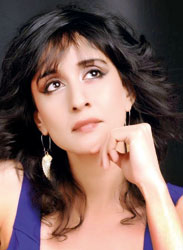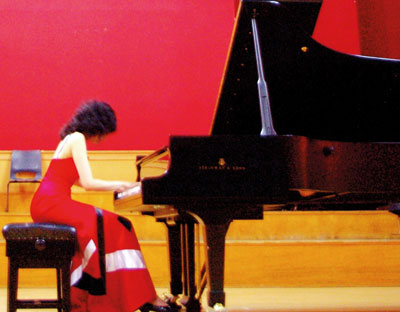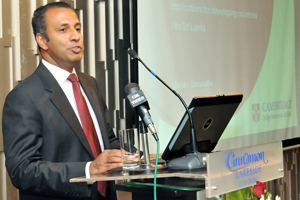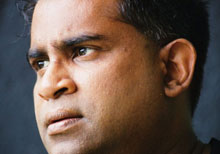If you think accomplishment in an unlikely combination of linguistics and music performance together with model-material looks, grace, candour and humility sprinkled with a few funny facts like ambidextrousness and synaesthesia is impossible in one person; Google Tanya Ekanayaka. She’s got it all.

Her mother being a piano teacher and father an amateur violinist, it must have been the inevitable that Tanya started piano lessons as young as five years old. But unlike for most of us, playing the piano – performing – was not just another extra-curricular activity for her, but the development of a relationship. “As performers we all go through stages when as much as you love to play and as important it is, you need to be away from it... Then you sort of run back and there's a greater need and so much intensity!” she explains, the questioning look in her eyes swiftly replaced by a distinct sparkle. It is probably this intimate relationship she has with the act of playing the piano itself that makes her performances so fluid, a seeming conversation between herself and the instrument. “I never stopped playing” we are emphatically told, “but there was a lull... God forbid a day when I can’t access a piano!”
Tanya doesn’t play the piano simply because she is phenomenally good at it or because she likes it, but in her own words, because she has to. “I need it” she tells me intently “it sounds almost selfish to say that, but yeah...” Seemingly paradoxical for a linguist, Tanya believes she does not express herself all that much through language in the common sense. “It’s through my compositions that most of me is reflected” is the explanation. Those “most personal, intense, traumatic” experiences of Tanya’s life translate to her music and not her verbal expression, she says, claiming that certain original compositions of hers can be correlated to specific personal experiences. “[This] is why I can’t let go... It’s pure love; pure passion and drive.”
But as “essential [a] part of life” as music is to her, Tanya knew, and her parents recognized, that “from a practical point of view, it’s a very risky thing to make a career out of music – especially in this country”. And so, along came academia. Tanya’s father was professor at the University of Peradeniya, and thus she grew up on the campus premises, constantly exposed to the “academic” kind of atmosphere of the place. Not a surprise then, that she was admitted to the English Honours programme at the university in 1999.
“Linguistics took hold of me” she says, almost amazed by it herself. There is an unexpected bounce and care-freeness in the slight frame and flyaway hair as we chat on her veranda that contrasts completely with the obvious strength of her expressive hands and the intense involvement evident in her piano playing. And so with laughter and sparkly eyes is narrated the experience of undergraduate studies with well-known linguist Thiru Kandiah. “I was very fortunate, he really inspired me” she enthuses. Unable to give up her first love, yet falling headlong into her academic interests, Tanya began at this stage to fuse language studies with music. Her undergraduate thesis was focussed on a combination of the two, and earned her a place on the staff at the Department of English at Peradeniya soon after graduation.
“Oh, it was lovely!” she says of her first experiences as a lecturer, adding with laughter that she learnt more during this time “‘cus they just put you in the deep end”. But it was “fabulous” she says to sit with Prof. Kandiah and have “long, long discussions about everything”. In 2007 Tanya was offered a scholarship to read for an MSc in linguistics at the University of Edinburg. She has just finished writing her PhD thesis at Edinburgh, again bringing music and linguistics together in a study of language mixing in Sri Lankan pop-music.
Tanya has also continued to teach in the linguistics and music departments at Edinburgh and it was while practicing on a piano at the department that she was heard by a more senior member of the staff and “quite by accident” launched into an international career in music performance. Her performances gained Tanya the reputation that finally led her to the highlight of her career so far: becoming the first Sri Lankan to play in the ‘Pianists of the World’ series at St. Martin-in-the-Fields in 2010. “It was a huge honour” she says quietly, humbly. The performance also marked the first occasion on which one of her compositions was part of the programme, as well as the first time a Sri Lankan composition was presented at that famed site. Since then, each of her concerts has featured an original composition (most of these – some found on YouTube – based on Sri Lankan tunes from her childhood). And these concerts too, have been many.
Despite these treasured achievements, Tanya’s heart was set on returning to Sri Lanka and her teaching position at the University of Peradeniya. And though she seems to deeply regret being unable to make it a reality yet, “I am determined to return” she says, of the future. “I miss a lot” she explains, so quiet and hesitant now. “I miss...the feeling of being home, because this is where my roots are.” She hopes that she will soon be able to perform in Sri Lanka, hinting that concerts with the SOSL will probably be in her agenda for the near future, once she has completed a series of performances at “prestigious” venues in New York.

“I've always felt that in Sri Lanka people are very very fond of music”, she laughs that it’s a silly thing to say. “There's a real interest, even though there is – ironically – very little scope for someone to make a career out of it. People want to sing and talk about music in a very uninhibited sort of way... and I think that's wonderful. And I think that is why there is a lot of talent here. It is sad though, that this whole classical music "business" is restricted to a certain class of people.” Tanya believes that if the musical sphere were to be opened up and broadened out, out of that would come the new sounds of our generation. “Of course it is inevitable that a lot of confused sounds will be emerging out of that endeavour, but that is natural, and you absolutely need it. Look at Bach and Beethoven – that's what they did. They messed around with what was there before them, and made it their own and did something new – and it was new pop music at the time!”
As we talk music, linguistics, technology, boys, food, infection, philosophy and pop culture, the conversation keeps returning to what Tanya fondly and emotively calls “my home”. With her education, her experience, her stunning looks, her achievements and fame, one expects Dr. (yes, Doctor!) Tanya Ekanayaka to be overbearing and bowl one over. But in the few hours of chatting, we learn the opposite. Far from losing herself in who she is, the slim girl with the dainty step is still very much aware of where she comes from, and the simplicity of her character driven by two things: love of music and love of home.


 Many of Peradeniya’s graduates from the 50’s and 60’s look back nostalgically past the serene surroundings and grand structures of the famed campus to the glory of her academic achievements, the brilliance of the intellectuals it produced, and most importantly the simple inspiration of its atmosphere. Those moments of genius, the hours of passionate discourse and the joy of intellectual stimulation seem to have all but disappeared from what used to be the home of the Social Science and Humanities departments of the University of Ceylon, but for two days last week, some of that clarity in the air of its heyday seemed revived. Intellectuals from around the globe gathered on the premises of the Faculty of Arts to mix, mingle, discuss and debate ‘Social Sciences and Humanities in 21st Century Sri Lanka’ at the first International Conference on the Social Sciences and the Humanities (ICSSH).
Many of Peradeniya’s graduates from the 50’s and 60’s look back nostalgically past the serene surroundings and grand structures of the famed campus to the glory of her academic achievements, the brilliance of the intellectuals it produced, and most importantly the simple inspiration of its atmosphere. Those moments of genius, the hours of passionate discourse and the joy of intellectual stimulation seem to have all but disappeared from what used to be the home of the Social Science and Humanities departments of the University of Ceylon, but for two days last week, some of that clarity in the air of its heyday seemed revived. Intellectuals from around the globe gathered on the premises of the Faculty of Arts to mix, mingle, discuss and debate ‘Social Sciences and Humanities in 21st Century Sri Lanka’ at the first International Conference on the Social Sciences and the Humanities (ICSSH). First of these distinguished speakers was President, Pugwash Conferences for Science and World Affairs and Deputy Chairman, Governing Board of Stockholm International Peace Research Institute, Jayantha Dhanapala. His provocative speech on ‘The Formulation of Foreign Policy in Independent Sri Lanka’ placed the topic in the sphere of a “legitimate public concern”, questioning Sri Lanka’s response, to “shirk or rise to the challenge” of fixing its international relations.
First of these distinguished speakers was President, Pugwash Conferences for Science and World Affairs and Deputy Chairman, Governing Board of Stockholm International Peace Research Institute, Jayantha Dhanapala. His provocative speech on ‘The Formulation of Foreign Policy in Independent Sri Lanka’ placed the topic in the sphere of a “legitimate public concern”, questioning Sri Lanka’s response, to “shirk or rise to the challenge” of fixing its international relations.  ‘Is there a Future for the Social Sciences and Humanities?’ Gishan Dissanaike, Adam Smith Professor of Corporate Governance at the University of Cambridge asked, in his address. “The harsh reality [is] that no university should have to say their students are unemployable” he said, pointing to the problem of tax-run universities producing a majority of graduates in what are generally considered non-income-generating fields of study. He drove home, with wit and fact, the idea that Sri Lankan departments of Social Sciences and Humanities need to begin focussing on quality over quantity.
‘Is there a Future for the Social Sciences and Humanities?’ Gishan Dissanaike, Adam Smith Professor of Corporate Governance at the University of Cambridge asked, in his address. “The harsh reality [is] that no university should have to say their students are unemployable” he said, pointing to the problem of tax-run universities producing a majority of graduates in what are generally considered non-income-generating fields of study. He drove home, with wit and fact, the idea that Sri Lankan departments of Social Sciences and Humanities need to begin focussing on quality over quantity. d Development’ in order to set some more people at their unease. Tracing the development of Sri Lankan universities and their decline in the recent past to badly formulated education/linguistic/recruitment policies she stressed “the realities have not changed... the quest for applied knowledge undermines the relevance of imagination, thought and reflection”. “Have our failures... impacted to perpetuate intolerance and violence that has been generated on campuses?” she asked of her fellow academics and teachers, “should we transform the guru-gola relationships that we often see today in hierarchical terms of an empowered teacher and a disempowered student, to the ‘Guttila Kavya’ model of a talented student who challenges the teacher?” As one might expect, this was one address that struck home with the attending undergraduates! From tertiary education to the focus on employment-driven degrees, Prof. Goonesekere addressed the issues of “sustainability” in development, and the attitude changes required to bring about such development.
d Development’ in order to set some more people at their unease. Tracing the development of Sri Lankan universities and their decline in the recent past to badly formulated education/linguistic/recruitment policies she stressed “the realities have not changed... the quest for applied knowledge undermines the relevance of imagination, thought and reflection”. “Have our failures... impacted to perpetuate intolerance and violence that has been generated on campuses?” she asked of her fellow academics and teachers, “should we transform the guru-gola relationships that we often see today in hierarchical terms of an empowered teacher and a disempowered student, to the ‘Guttila Kavya’ model of a talented student who challenges the teacher?” As one might expect, this was one address that struck home with the attending undergraduates! From tertiary education to the focus on employment-driven degrees, Prof. Goonesekere addressed the issues of “sustainability” in development, and the attitude changes required to bring about such development. Avid blogger Dr. Pradeep Jeganathan who is more (or less?) significantly Senior Consultant Social Anthropologist for the Consortium of Humanitarian Agencies took a slightly different approach to his keynote address on ‘Politics, Ethics and the Human Sciences’. Wittily he drew on Althusser, Foucalt and enlightenment trends in “scientific inquiry”, in order to bring to light the political implications of disciplinary practice, questioning the construction of the relationship between student and subject. In the light of such heavily philosophical discussion, Prof. Priyan Dias from the Department of Civil Engineering, University of Moratuwa, made during the final panel discussion on ‘Priorities for Higher Education in 21st Century Sri Lanka: Natural Sciences and Technology versus Social Sciences and Humanities’, the important yet seemingly disregarded observation that “the humanist project as we see it, even as I see it, is an elitist one”. And as Nishan de Mel, Executive Director, Verite Research, concluded his take on the panel discussion, “the humanities is not about humanising, but about making sense of the complexities of being human”.
Avid blogger Dr. Pradeep Jeganathan who is more (or less?) significantly Senior Consultant Social Anthropologist for the Consortium of Humanitarian Agencies took a slightly different approach to his keynote address on ‘Politics, Ethics and the Human Sciences’. Wittily he drew on Althusser, Foucalt and enlightenment trends in “scientific inquiry”, in order to bring to light the political implications of disciplinary practice, questioning the construction of the relationship between student and subject. In the light of such heavily philosophical discussion, Prof. Priyan Dias from the Department of Civil Engineering, University of Moratuwa, made during the final panel discussion on ‘Priorities for Higher Education in 21st Century Sri Lanka: Natural Sciences and Technology versus Social Sciences and Humanities’, the important yet seemingly disregarded observation that “the humanist project as we see it, even as I see it, is an elitist one”. And as Nishan de Mel, Executive Director, Verite Research, concluded his take on the panel discussion, “the humanities is not about humanising, but about making sense of the complexities of being human”.